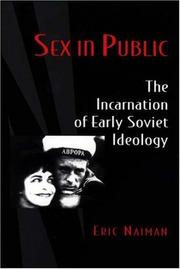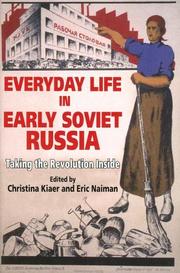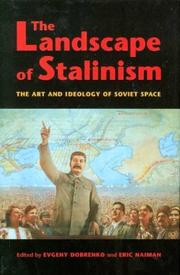| Listing 1 - 10 of 12 | << page >> |
Sort by
|
Book
ISBN: 0801460239 0801448204 Year: 2010 Publisher: Ithaca : Cornell University Press,
Abstract | Keywords | Export | Availability | Bookmark
 Loading...
Loading...Choose an application
- Reference Manager
- EndNote
- RefWorks (Direct export to RefWorks)
In an original and provocative reading of Vladimir Nabokov's work and the pleasures and perils to which its readers are subjected, Eric Naiman explores the significance and consequences of Nabokov's insistence on bringing the issue of art's essential perversity to the fore. Nabokov's fiction is notorious for the interpretive panic it occasions in its readers, the sense that no matter how hard he or she tries, the reader has not gotten Nabokov "right." At the same time, the fictions abound with characters who might be labeled perverts, and questions of sexuality lurk everywhere. Naiman argues that the sexual and the interpretive are so bound together in Nabokov's stories and novels that the reader confronts the fear that there is no stable line between good reading and overreading, and that reading Nabokov well is beset by the exhilaration and performance anxiety more frequently associated with questions of sexuality than of literature. Nabokov's fictions pervert their readers, obligingly training them to twist and turn the text in order to puzzle out its meanings, so that they become not better people but closer readers, assuming all the impudence and potential for shame that sexually oriented close-looking entails. In Nabokov, Perversely, Naiman traces the connections between sex and interpretation in Lolita (which he reads as a perverse work of Shakespeare scholarship), Pnin, Bend Sinister, and Ada. He examines the roots of perverse reading in The Defense and charts the enhanced attention to the connection between sex and metafiction in works translated from the Russian. He also takes on books by other authors-such as Reading Lolita in Tehran-that misguidedly incorporate Nabokov's writing within frameworks of moral usefulness. In a final, extraordinary chapter, Naiman reads Dostoevsky's The Double with Nabokov-trained eyes, making clear the power a strong writer can exert on readers.
Paraphilias in literature. --- Sex in literature. --- Sexual deviation in literature --- Sexual perversion in literature --- Nabokov, Vladimir Vladimirovich, --- Sirin, Vladimir, --- Sirin, Vl. --- Sirin, V. --- Nabokoff-Sirin, Wladimir, --- Sirin, Wladimir Nabokoff-, --- Nabokov, Vladimir, --- Shishkov, Vasiliĭ, --- Набоков, Владимир Владимирович, --- Набоков, Владимир, --- נאבוקוב, ולאדימיר ולאדימירוביץ׳, --- נאבוקוב, ולאדימיר, --- נבוקוב, ולדימיר, --- 納布可夫, --- Godunov-Cherdynt︠s︡ev, Fedor --- Criticism and interpretation.

ISBN: 0691026262 Year: 1997 Publisher: Princeton (N.J.) : Princeton university press,
Abstract | Keywords | Export | Availability | Bookmark
 Loading...
Loading...Choose an application
- Reference Manager
- EndNote
- RefWorks (Direct export to RefWorks)
Communism and sex --- Soviet Union --- History
Book
ISBN: 9780801448201 Year: 2010 Publisher: Ithaca : Cornell University Press,
Abstract | Keywords | Export | Availability | Bookmark
 Loading...
Loading...Choose an application
- Reference Manager
- EndNote
- RefWorks (Direct export to RefWorks)
Book
ISBN: 9780691194516 Year: 2019 Publisher: Princeton, NJ
Abstract | Keywords | Export | Availability | Bookmark
 Loading...
Loading...Choose an application
- Reference Manager
- EndNote
- RefWorks (Direct export to RefWorks)
Book
ISBN: 9780801460234 Year: 2011 Publisher: Ithaca, NY
Abstract | Keywords | Export | Availability | Bookmark
 Loading...
Loading...Choose an application
- Reference Manager
- EndNote
- RefWorks (Direct export to RefWorks)
Digital
ISBN: 9780691194516 Year: 2019 Publisher: Princeton, N.J. Princeton University Press
Abstract | Keywords | Export | Availability | Bookmark
 Loading...
Loading...Choose an application
- Reference Manager
- EndNote
- RefWorks (Direct export to RefWorks)
Digital
ISBN: 9780801460234 9780801448201 Year: 2011 Publisher: Ithaca, N.Y. Cornell University Press
Abstract | Keywords | Export | Availability | Bookmark
 Loading...
Loading...Choose an application
- Reference Manager
- EndNote
- RefWorks (Direct export to RefWorks)

ISBN: 0253346398 025321792X Year: 2006 Publisher: Bloomington (Ind.) : Indiana university press,
Abstract | Keywords | Export | Availability | Bookmark
 Loading...
Loading...Choose an application
- Reference Manager
- EndNote
- RefWorks (Direct export to RefWorks)
Quality of life --- Soviet Union --- Social life and customs --- Social conditions

ISBN: 0295983337 9780295983332 9780295801179 0295801174 0295983418 9780295983417 Year: 2003 Publisher: Seattle University of Washington Press
Abstract | Keywords | Export | Availability | Bookmark
 Loading...
Loading...Choose an application
- Reference Manager
- EndNote
- RefWorks (Direct export to RefWorks)
Communism and culture --- Socialist realism. --- Stalin, Joseph, --- Socialist realism --- Communisme et culture --- Réalisme socialiste --- Réalisme socialiste --- Realism, Socialist --- Communist aesthetics --- Djougatchvili, Iossif Vissarionovitch, --- Джугашвили, Иосиф Виссарионович, --- Dzhugashvili, Iosif Vissarionovich, --- Koba, --- Shih-tʻai-lin, --- Sidalin, --- Ssu-ta-lin, --- Stalin, Giuseppe, --- Сталин, И. В. --- Stalin, I. V. --- Сталин, Иосиф, --- Stalin, Iosif, --- Сталин, К., --- Stalin, K., --- Staline, --- Staline, Joseph, --- Staljin, J. V., --- Sutārin, --- Soselo, --- Stalini, Ioseb Besarionis że, --- Sṭalin, Y. Ṿ., --- Sṭalin, Y., --- Stalin, Josef, --- Stalin, Josef Vissarionovich, --- סטאלין, יאסיף, --- סטאלין, י. --- סטאלין, י. וו --- סטאלין, י. װ. --- סטאלין, י., --- סטלין, יוסיף ויסאריונוביץ׳, --- סטלין, יוסף --- 斯大林, --- Stalin, Jossif Vissarionovitš, --- Sztálin, Joszif, --- Istālīn, Yūsīf Vīsāryūnūvīch, --- استالين، يوسيف ويساريونووتج, --- Σταλιν, Ιωσηφ, --- Stalin, Ιōsēph, --- Jughashvili, Ioseb, --- Jughashvili, Ioseb Vissarionovich, --- Jughashvili, Koba,
Book

ISBN: 2821868146 1800641192 Year: 2021 Publisher: Cambridge Open Book Publishers
Abstract | Keywords | Export | Availability | Bookmark
 Loading...
Loading...Choose an application
- Reference Manager
- EndNote
- RefWorks (Direct export to RefWorks)
This edited volume employs the paradoxical notion of ‘anticipatory plagiarism’—developed in the 1960s by the ‘Oulipo’ group of French writers and thinkers—as a mode for reading Russian literature. Reversing established critical approaches to the canon and literary influence, its contributors ask us to consider how reading against linear chronologies can elicit fascinating new patterns and perspectives. Reading Backwards: An Advance Retrospective on Russian Literature re-assesses three major nineteenth-century authors—Gogol, Dostoevsky and Tolstoy—either in terms of previous writers and artists who plagiarized them (such as Raphael, Homer, or Hall Caine), or of their own depredations against later writers (from J.M. Coetzee to Liudmila Petrushevskaia). Far from suggesting that past authors literally stole from their descendants, these engaging essays, contributed by both early-career and senior scholars of Russian and comparative literature, encourage us to identify the contingent and familiar within classic texts. By moving beyond rigid notions of cultural heritage and literary canons, they demonstrate that inspiration is cyclical, influence can flow in multiple directions, and no idea is ever truly original. This book will be of great value to literary scholars and students working in Russian Studies. The introductory discussion of the origins and context of ‘plagiarism by anticipation’, alongside varied applications of the concept, will also be of interest to those working in the wider fields of comparative literature, reception studies, and translation studies.
Literature Slavic --- Russian literature --- classics --- anticipatory plagiarism --- Tolstoy --- Gogol --- comparative literature --- cultural heritage --- Russian Studies --- nineteenth-century literature
| Listing 1 - 10 of 12 | << page >> |
Sort by
|

 Search
Search Feedback
Feedback About UniCat
About UniCat  Help
Help News
News